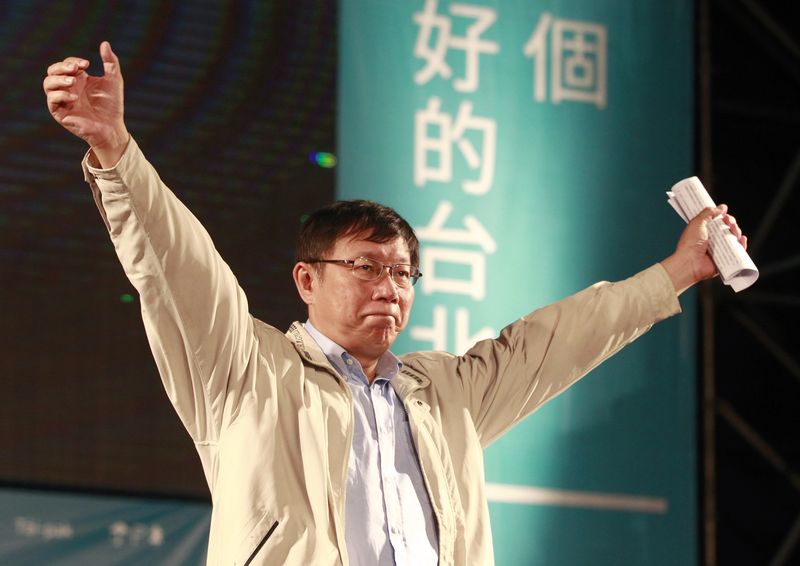By Michael Gold and Faith Hung
TAIPEI (Reuters) - Taiwan's China-friendly ruling party lost a slew of traditional strongholds in local elections on Saturday, triggering the resignation of the island's premier and the cabinet.
The worse-than-expected showing underlined the growing unpopularity of the government of President Ma Ying-jeou, which has been trying to forge closer ties with China.
China is Taiwan's largest trading partner, but Beijing has never renounced the use of force to take back what it deems a breakaway province.
The ruling Kuomintang (KMT) shed seats across the island, including in the capital Taipei, where a candidate backed by the pro-independence opposition party was elected as the next mayor, ending the ruling party's 16-year hold on the city.
The local elections, held less than two years ahead of a presidential poll, were the first chance for voters to make their views felt since thousands of young people occupied parliament in March in an unprecedented demonstration against a planned trade pact calling for closer ties with Beijing.
The departure of premier Jiang Yi-huah just hours after polls closed left President Ma, who is also KMT chairman, to rebuild a government.
The cabinet also steps down, as is customary when the premier resigns. A new premier is expected to be announced soon, followed by new ministerial appointments.
In Taipei, independent candidate Ko Wen-je, a 55-year-old surgeon backed by the opposition, pro-independence party, defeated the KMT's Sean Lien, the son of a wealthy and politically connected family.
Every Taiwan president has been a former mayor of Taipei since the island introduced direct presidential elections in
1996.
A crowd of several thousand Ko supporters filled the wide city street outside of his campaign headquarters, with rock music blaring out of loud speakers.
Kuo Hsin-tai, a 40-year-old photocopy shop owner and supporter of Ko, said he had grown disillusioned with the Kuomintang.
"They're making Taiwan far too dependent on the mainland. Their policy-making muscle is far too focused on cross-strait ties and not nearly enough on raising the standard of living of the average Taiwanese person."
Ko told supporters his win symbolized the "desire for progress" among Taipei residents and that the anti-China protests in March that blocked ratification of a pact with China also highlighted the power of "people movements".
A record 11,130 seats were up for grabs in Saturday's election in municipalities, counties, townships and villages nationwide.
The KMT also lost Taichung, in central Taiwan, another of the ruling party's former strongholds.
China's Taiwan Affairs Office, which is in charge of Taiwan matters for Beijing, said in a statement following the vote that it hoped "cross-strait compatriots" would jointly safeguard the peaceful development of cross-strait relations.
President Ma said the KMT had suffered a serious setback and he apologised to the party. But party spokesman Charles Chen said Ma had no plans to resign as Kuomintang chairman.

Government employee Wang Ling-li, 28, said: "I think Taiwanese people have lost their faith in the KMT in recent years. They've been in power for so long, but the economy is still stagnant. Their dealings with China should take on a much more open form than they have."
(Additional reporting by J.R. Wu in TAIPEI and Ben Blanchard in BEIJING, editing by Rosalind Russell)
